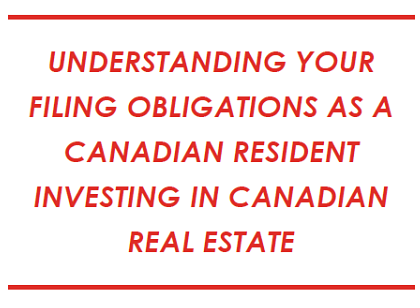RENTAL INCOME REPORTING
As a Canadian resident investing in Canadian real estate, you will have to report your worldwide income to the Canada Revenue Agency (“CRA”). This includes rental income from Canadian real estate. The CRA allows deductions for related expenses, such as insurance, mortgage interest, property taxes and repairs. A deduction for tax depreciation (capital cost allowance or CCA) on the property, excluding land, is also available. While claiming CCA cannot create a rental loss, which is deductible against other sources of income, it may reduce the net rental income to zero.
If you are a non-resident read this post.
PRINCIPAL RESIDENCE ELECTION
The deemed disposition recognized at the time the change in use occurs is automatic. However, an election may be filed, under subsection 45(2) of the Income Tax Act, with the tax return in the year that the change occurs. By making the election, the change in use from a “personal use” property to an “income producing” property is deemed to occur with no immediate deemed disposition, meaning there is no taxable event recognized at that time. This election may preserve your right to designate the property as a principal residence for up to 4 years. If the election is made, CCA is not permitted to be claimed in any year. Claiming CCA will make the election invalid.
Planning should be undertaken to determine which option makes sense as there are a lot of factors which must be considered.
RENTING A PRINCIPAL RESIDENCE
The rental property may be a home previously used as your primary residence. There are tax consequences when you change the use of the property from a personal use property to an income producing property. At the time, when you begin renting the property or the property is available for rent, a deemed disposition of the property is considered to occur. This means that you are required to report the disposition of your principal residence at fair market value. If you have not previously designated a property as a principal residence for the period over which the property was owned, you may be eligible for the principal residence exemption to recognize the deemed disposition on a tax-free basis.
RENTING A PORTION OF YOUR HOME
Many Canadians chose to use their principal residence as an investment property to generate rental income. However, there are tax consequences when you change the use of your home from a personal use property to an income producing property. At the time, when you begin renting the property or the property is available for rent, a deemed disposition of the property is considered to occur. This means that you are required to report the disposition of your principal residence at fair market value. If you have not previously designated a property as a principal residence for the period over which the property was owned, you may be eligible for the principal residence exemption to recognize the deemed disposition on a tax-free basis.
FLIPPING PROPERTIES
Investing in real estate for the purposes of “flipping” is quite popular. If you are planning to flip properties, the tax treatment may be considered as ordinary income as opposed to capital gains. If you are in the business of buying and selling properties, the profit is taxed as business income. As a result, the capital gains treatment is not available. You will be subject to income tax at the marginal rates, on 100% of the profit.
The determination of the nature of the transaction as income or capital, is very fact based, however, it may be very easy for the CRA and the tax courts to consider “house flipping” to be business income. The courts generally look at the following factors when making the determination:
- taxpayer’s motive;
- nature of the property sold;
- the length of ownership;
- frequency of similar transactions;
- time and effort spent regarding the property and circumstances surrounding the sale of the property
GST/HST Considerations
Depending on the level and type of rental revenue, you may have to register and start collecting and remitting the GST/HST.
Accommodations rented for a consecutive period of more than one month are excluded from GST/HST. However, GST/HST would be collected and remitted for commercial rentals and residential rentals where the occupancy period is less than one consecutive month (e.g. Bed & Breakfast, Airbnb, shared accomodations, etc.).
It is important to understand the many aspects of investing in Canadian real estate to ensure you are reporting the income properly as well as paying both income and sales taxes as applicable.
Click here for a downloadable PDF version of this post.



